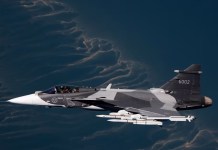US aerospace giant Boeing has bagged an $805-million contract from the Pentagon to produce mid-air refuelling drones for the US Navy. This contract from for the US Navy has the potential to inflate to a whopping $13B.
- Boeing vs Airbus: Competition Heats-Up in India for a Massive Deal
- France, Russia to Compete for Indian Navy’s $8B Submarine Project
Boeing is expected to deliver four MQ-25A Stingrays in the first phase of the contract, which can eventually inflate into $13 billion if the US Navy awards its full order of 72 drones to Boeing. The US Navy plans to deploy four drones onboard each of the 10 aircraft carriers that it presently operates.
The Stingrays will replace F/A-18 Super Hornets that are specifically designed to support other carrier-based aircraft such as F/A-18 Hornet or F-35C to increase their range by refuelling in flight.
“MQ-25A is a hallmark acquisition program,” said Assistant Secretary of the Navy for Research, Development, and Acquisition James F. Geurts. “This program is an excellent example of how the acquisition and requirements communities work hand in hand to quickly deliver abilities to our Sailors and Marines in the fleet.”
After being launched by catapult off a carrier deck, the unmanned aircraft will be remotely programmed to fly over areas that are out of reach for conventional aerial tankers. The Stingrays will be also easier and economical to maintain than the refuelling Super Hornets.
According to the Pentagon, the agreement incorporates design, development, fabrication, testing, verification, certification, delivery, and maintenance for the four MQ-25A unmanned air vehicles. To land the contract, Boeing had to beat competing bids from Lockheed Martin and General Atomics.
More News at EurAsian Times
- Indian Military Base in Sabang can Strangle China at the Strait of Malacca
- Major Spat Between India and Pakistan Over Free Balochistan Office In Delhi
- Saudi Arabia Halts All Oil Shipments After Yemen Missile Attack
- Saudi Crown Prince Unravels Deep Secrets Behind Wahhabism and the Yemen War




